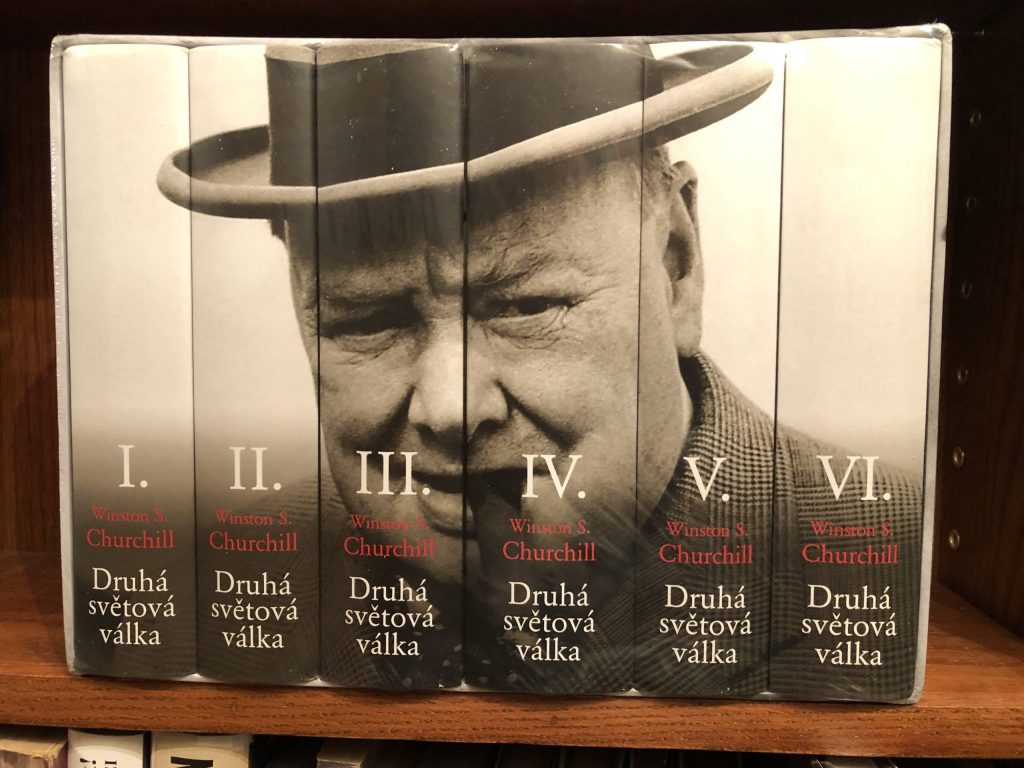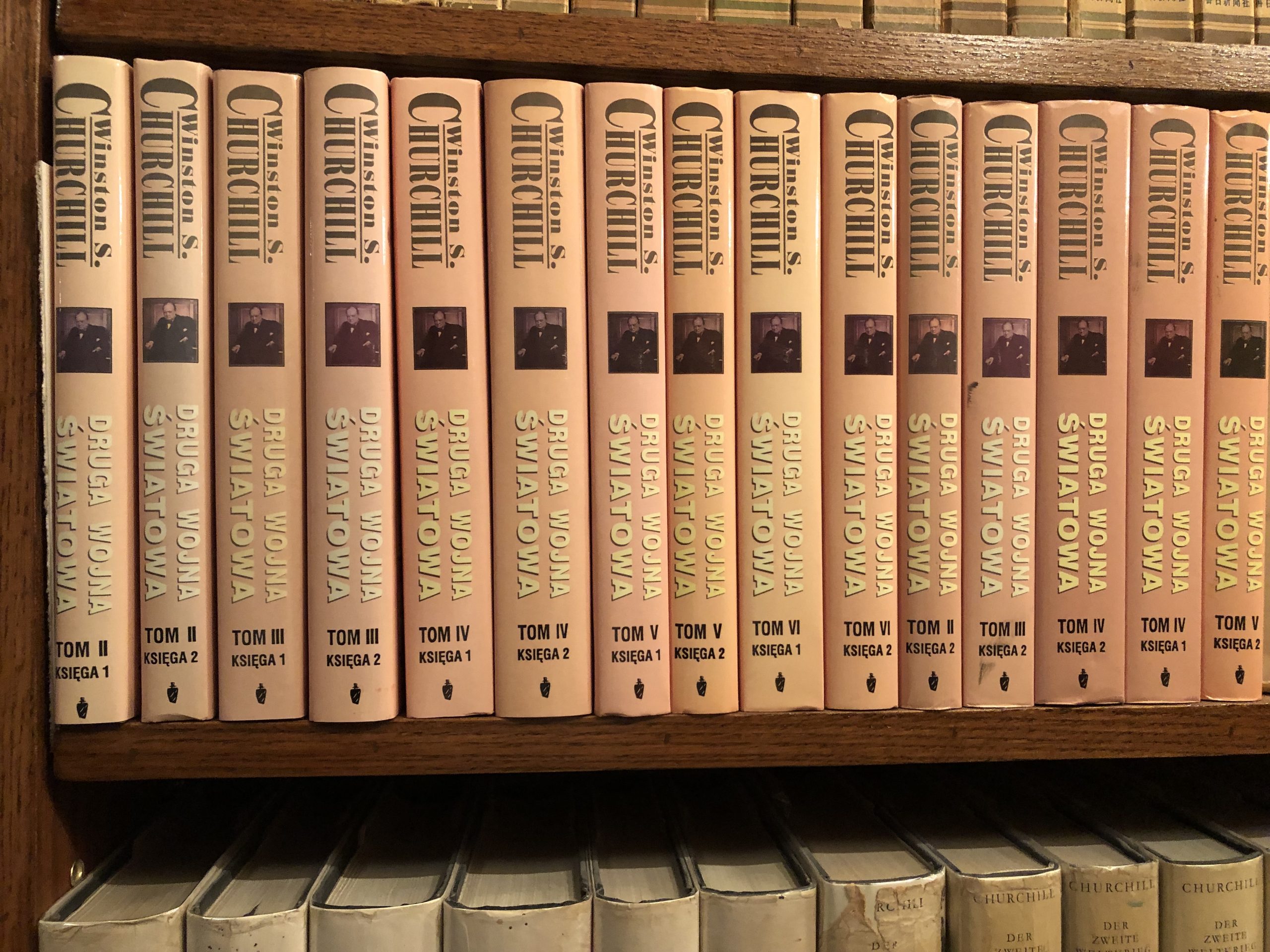
Finest Hour 186
COHEN CORNER – Churchill’s Works in Eastern Bloc Editions

The Czech version of The Second World War
February 19, 2020
Finest Hour 186, Fourth Quarter 2019
Page 40
By Ronald I. Cohen
Ronald I. Cohen MBE is author of A Bibliography of the Writings of Sir Winston Churchill, 3 vols. (2006).
When I first thought of this article, I had been struck by the number of recent Eastern Bloc editions. Then I thought, “Why only recent?” It seems intriguing to contemplate a longer time span. After all, while Churchill’s writings have been translated into thirty-one languages, thirteen of these are in Eastern Bloc languages, and, of the recent translations (since 2014), even Savrola and My Early Life are included, as well as the more predictable Second World War.
Intriguingly, the oldest of Churchill’s works to be translated was his very first, The Story of the Malakand Field Force (A1). It is also one of the more recent books to be translated into an Eastern Bloc edition. First published in March 1898, it was translated into Czech as Příběh malakandského sboru (Brno: Jota, 1997). Savrola (A3), Churchill’s only novel, which was first published in volume form in 1900, has been translated into eight languages, finally attracting Eastern Bloc treatment in Hungary as Savrola: forradalom Laurániában (Budapest: Metropolis Media, 2010) and Ukraine, as Саврола (Zhupansky: Kiev, 2017).
Churchill’s First World War history, The World Crisis (A69), was his first multi-volume set. The six volumes were 1911–14, 1915, 1916–18 (published in two parts), The Aftermath, and The Eastern Front. Thus far none of these has been translated into any Eastern Bloc language. In 1931, however, an abridged edition was published in English, and it attracted twelve translations including Czech, Russian, and Serbian. The Czech translation was Světová krise: 1911–1918 (Prague: Melantrich, 1932, in three volumes), and the Russian was Мировой кризис (Moscow: Gosydarstvennoe, 1932). A new issue of Мировой кризис 1918–1925 was published by Librokom in Moscow in 2014.

2024 International Churchill Conference
The existence of the Serbian translation of the abridged World Crisis, however, came as a late surprise to me. When my Bibliography was published in early 2006,I had concluded that the “[Serbo-Croatian] translation rights were sold for an advance of £25 against a 15% royalty; however, these rights were never exercised.” That proved to be incorrect, and I was glad to be proven wrong. When a good friend of mine was travelling to Belgrade back in 2007, he asked if he could get me anything. I said, “Yes, please find me a Serbian [i.e., Cyrillic] translation of the Second World War.” When he returned to Ottawa, he explained that a Belgrade antiquarian bookseller had advised him that no such translation existed (but see The Second World War below). At lunch, however, my friend opened his shopping bag to show me a two-volume set of Светски рат (Kosmos: Belgrade, 1936), the Serb edition of The World Crisis abridgement, which, contrary to my published bibliographical assertion, did indeed exist. This error will be gleefully corrected in the revised edition of the Bibliography.

None of the volumes of war speeches was translated into any of the Soviet-sphere languages except into Czech, by the Prague publishing house Fr. Borový, which published each of the six Cassell war speech volumes following the war between 1946 and 1948: Do boje (Into Battle, A142); Nelítostný zápas (The Unrelenting Struggle, A172); Vzhůru k vítězství (Onwards to Victory, A194); Červánky osvobození (The Dawn of Liberation, A214); and Vítězství-Projevy v tajných schůzích sněmovny, which combines Victory (A223) and Secret Session Speeches (A227).
Not surprisingly, Churchill’s sole autobiographical work My Early Life (A91), which was first published in 1930, has been translated into twenty languages, including Czech, Hungarian, Romanian, Russian, and Slovene. What is surprising, though, is that the first translation was so late, considering that the book is such a light, humorous, and accessible work. Moja mlada leta, the Slovene translation was the first, appearing in 1976 (Ljubljana: Cankarjeva založba). Next came the Czech version, Mé životní začátky (Prague: NLN, Nakladatelství Lidové noviny, 1996); then the Russian, Мои ранние годьі 1874–1904 (Moscow: Kolubri, 2012); and most recently the Romanian, Anii tinereţii mele (Bucharest: Editura Herald, 2017) and the Hungarian, Ifjúságom, 1874–1904 (Budapest: Saxum, 2017).
A History of the English-Speaking Peoples (A267) has been translated into eleven languages, of which three are from Soviet Bloc nations. The Czech translation is Dějiny anglicky mluvících národů (Prague: Český spisovatel, 1996–99); the Russian is Рождение Британйи (Smolensk: Rusich, 2002), but only of the first volume, The Birth of Britain; and the Hungarian is Az angol ajkú népek története (Budapest: Európa, 2004).
The most frequently translated work is, not surprisingly, The Second World War (A240). Of the twenty-eight translations, fully ten are from behind the Iron Curtain. For ease these are listed below, but I would first like to inject a couple of notes regarding the Russian and Serbian translations. Intriguingly the first Russian translation was published not in Moscow, as would have been expected, but in New York City during the height of the Cold War. As for the Serbian translation, which I had asked my friend to ferret out in Belgrade, the antiquariat he had consulted misled him when he advised that no such Cyrillic translation existed. I knew it had because I had handled the set myself in the Nacionalni i Sveučilisna Biblioteka in Zagreb. I just wanted to purchase a copy. Here, then, is the full list:
Belarusian: Вторая мировая война
(Minsk: Harvest, 2003)
Bulgarian: Втората световна война: Мемоари
(Sofia: Trud, 1993)
Croatian: Drugi svetski rat
(Belgrade: Prosveta, 1964)
Czech: Druhá světová válka
(Prague: Lidové noviny, 1992-5, and by NLN, Nakladatelství Lidové noviny, 2005)
Estonian: Tormihoiatus
(Tallinn: Varrak, 2019) (The Gathering Storm only)
Hungarian: A második világháború
(Budapest: Kossuth Kiadó, 1972)
Lithuanian: Antrasis pasaulinis karas
(Vilnius: Leidykla Briedis, 2018)
Polish: Druga wojna światowa,
(Gdansk: Phantom Press International/Refren, 1994–96, in 12 volumes)
Russian: Вторая мировая война (New York: Chekhov Publishing House of the East European Fund, 1956–58) (books 1 and 2 of each of volumes I–III only having been translated and published in six parts); Moscow: Voenizdat, 1991 (books 1 and 2 of each of volumes I–VI having been translated and published in three volumes); and Moscow:
Terra-Knizhnaya Lavka,1997–98, in 6 volumes.
Serbian: Други светски рат
(Belgrade: Prosveta, 1964)
Slovene: Druga svetovna vojna
(Ljubljana: Borec, 1964)
There were also five speech pamphlets translated into Russian and several compilations of collected war speeches (in Bulgarian, Romanian, Russian, and other non-Bloc languages) not corresponding to any English-language edition but promoted during the Second World War by the British Central Office of Informatio, probably for propaganda purposes. There is also a collection of Correspondence Between the Chairman of the Council of Ministers of the U.S.S.R. and the Presidents of the U.S.A. and the Prime Ministers of Great Britain during the Great Patriotic War of 1941–1945 (F138), originally published in Russian and subsequently in Croatian, Polish, and other non-Bloc languages.
Subscribe
WANT MORE?
Get the Churchill Bulletin delivered to your inbox once a month.


